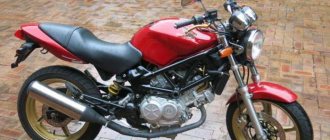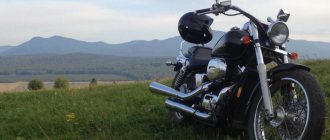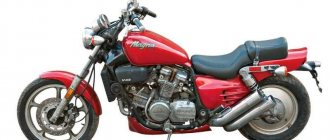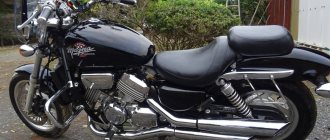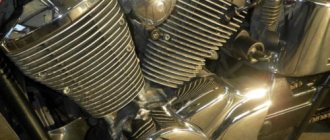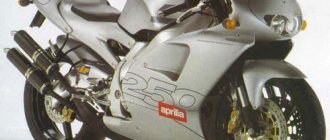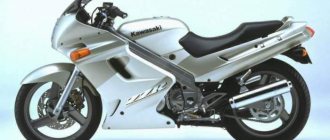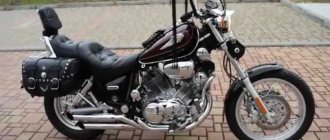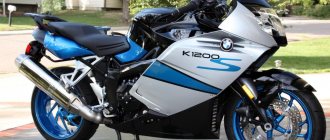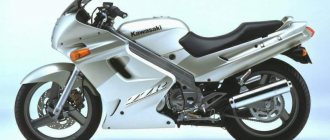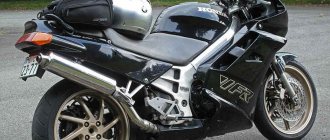Motorcycle Honda CBR 400
For the first time, the Honda CBR 400 sports class motorcycle was officially introduced back in 1988. The car turned out to be very successful and lasted on the assembly line for 11 years, until 1999. The CBR 400 was originally created taking into account the specific tastes and requirements of the Japanese, and therefore was not intended for sale outside the Land of the Rising Sun.
Model overview
40 years of evolution and technical progress have given us today a fairly powerful, compact, beautiful and technically well-equipped middle-class motorcycle - the Honda CB 400 Super Four Hyper VTEC 4 versions REVO and BOLDOR.
The motorcycle is equipped with a 4-cylinder, 16-valve water-cooled engine with a displacement of 399 cm³. The car was created for the Japanese domestic market, because there are restrictions for beginner motorcyclists: the engine volume should not exceed 400 cm³, and the power should not exceed 53 hp. The engine is also equipped with an electronic injection system PGM-FI Fuel and a VTEC system.
VTEC works as follows: because the engine is 16-valve (4 valves per cylinder), then from 1st to 5th gear up to 6300 rpm only 2 valves per cylinder are used in the engine operation, the second pair of valves is activated above 6300 rpm and at a fully open throttle to increase power . In 6th gear, all 16 valves are engaged in engine operation.
The appearance of the motorcycle leaves no one indifferent - not only the driver gets pleasure from riding it, but also all passers-by turn around and follow this beautiful car with their eyes.
In terms of design, the motorcycle belongs to the “naked bike” class: it completely lacks plastic panels and fairings, the headlight is round, and the speedometer and tachometer are not covered in any way. The exception is the BOLDOR version: it is equipped with a front fairing and a square headlight .
The riding position on the motorcycle is classic, not sporty, so long-distance trips are not tiring, but for them it is better to have at least a little wind protection, or a BOLDOR version with a fairing: the motorcycle reaches a maximum speed of up to 190 km/h, which is quite a high figure, and At such speeds, drag increases greatly.
The motorcycle is very practical, has a relatively light weight, and is compact in size, making it well suited for dense city traffic and maneuvering between cars in traffic jams.
The motorcycle has a fairly powerful braking system - a large 2-disc brake at the front and a single-disc brake at the rear. The motorcycle has high dynamic characteristics - it accelerates to 100 km/h in 4.5 seconds.
All models of Honda motorcycles in the lineup have impressive characteristics, in each group of motorcycles by type.
Fuel consumption per 100 km in city mode is 4-8 liters, depending on the driver’s driving style.
The figures are so high because the CB400 engine is a modified CBR400RR engine. The modification consisted of increasing torque at low speeds and reducing fuel consumption compared to a sports motorcycle.
The design of the hero of our article is very close to English and resembles Triumph motorcycles. The model range can be found in our article.
The older brother from the Honda lineup was also not deprived of our attention, read here. Review of the motorcycle and its technical characteristics.
Flaws
It is inconvenient to change spark plugs and clean carburetors on a bike - you have to remove a lot of things.
During operation, users found only 2 minuses. Moreover, both are explained by the sporting fate of the model.
- Good traction only at high speeds - the engine is boosted for racing.
- A small resource of parts - when the bike is constantly in the hands of specialists, the resource is not the main thing.
The second is the lack of original spare parts , since no official support for the model was offered in Europe.
and dignity
Overall, the Honda CBR400RR is one of the best sporty city bikes - nimble, light and economical.
The model has many more advantages:
- good wind protection, unusual for sportsmen;
- excellent brakes;
- excellent dynamics for its class;
- despite the huge amount of body kit - light weight;
- reasonable price for used.
Brief history of the model
- 1988 - start of production and sales of the Honda CBR 400 RR model, which replaced the Honda CBR 400 R Aero. This year's models have the Hurricane prefix on the lower side plastic. The first generation of the motorcycle. The frame number is NC23. The full model name is CBR400RR-J.
- 1989 - full model name - CBR400RR-K. The Hurricane prefix is removed from the plastic.
- 1990-1991 - second generation of the motorcycle. The frame number is NC29. The full model name is CBR400RR-L.
- 1992-1993 — full model name — CBR400RR-N.
- 1994 - full model name - CBR400RR-R. Starting this year, the model receives the Fireblade prefix at the top of the side plastic.
- 1999 is the last year of production of the Honda CBR 400 RR.
Specifications
In terms of its parameters, this motorcycle is very good. Its performance even today is impressive and makes the model interesting for those who want to buy a cheaper motorcycle, but in good condition. This is a reliable car that has a very long service life, so even if it has been driving for more than a dozen years, its condition can be excellent.
Engine
The inline four shows good maximum performance: torque is 40 Nm and power is 53 hp. These are not such small figures for a unit with a volume of 399 cm³. The speed limit here is 190 km/h. For a small entry-level sportbike, you don’t need anything more powerful.
Class
| Classic 9 Sports 14 | Streetfighter 2 |
Engine capacity
docub. cm.
Transmission
The gearbox here is six-speed, and the drive is of a chain type. Thanks to this transmission, the Honda CBR 400 RR can accelerate well in any of the six gears. In addition, due to the type of drive, power is not lost when the motor potential transfers to the wheel.
Dimensions and weight
The motorcycle has average dimensions for the class: its wheelbase is 1375 mm, its height is 1080 mm, its length is 1990 mm, its width is 670 mm, and its seat height is 750 mm. The weight of the CBR 400 RR is 170 kg, and its tank volume is 15 liters. Fuel consumption greatly depends on driving style. In an aggressive sports race, up to 10 liters can be spent per hundred kilometers, while during quiet movement, about 5 liters can be spent.
Chassis and brakes
The frame of the bike is diagonal and made of aluminum. The latter circumstance makes the motorcycle lighter and much more in line with the sporty direction of the motorcycle than, for example, a steel one. The wheels are alloy and look very elegant, despite their simplicity.
At the rear, a progressive monoshock absorber is used as suspension. At the front, a 41 mm telescopic fork is used. The rear brake features a 220 mm disc along with a two-piston caliper, while the front uses a pair of 275 mm discs along with four-piston calipers.
Fuel consumption
The average fuel consumption of the Honda CBR 400 RR is 5-6 liters in quiet mode and up to 10 liters per 100 km in aggressive driving style.
Dimensions and weight
The second generation of the motorcycle did not change its mass:
- Dry weight was 162 kg .
- Curb - 179 kg .
At the same time, the motorcycle stood up, but became smaller in all other parameters (the first value before restyling, the second after):
- in length - 2202, 1990 mm ;
- width - 690, 670 mm ;
- height - 1110, 1080 mm .
On the saddle - 765, 750 mm . Wheelbase - 1370, 1365 mm. Ground clearance - 120, 125 mm .
Production
The motorcycle was produced from 1988 to 1999, which in itself speaks of its popularity. However, even after so many years, it continues to remain very relevant, especially if a person does not have much money, but the desire to purchase at least some kind of sports bike is enormous.
Technical characteristics of CBR400 R on nc23 frame
CBR400 Aero / CBR400 RRK
| Specifications/Models | CBR400RG (Aero) | CBR400 RH-Ya (Aero) | CBR400RRJ | CBR400RRK |
| Year of issue | 1986 | 1987 | 1988 | 1989 |
| Frame number from... / to... | NC23-1000027 | NC23-1015001 | NC23-1020011 | NC23-1090001 |
| NC23-1010690 | NC23-1016160 | NC23-1036454 | NC23-1098116 | |
| Engine number from... / to... | NC23E-1000042 | NC23E-1015002 | NC23E-1020001 | NC23E-1090001 |
| NC23E-1010736 | NC23E-1016192 | NC23E-1036510 | NC23E-1098123 | |
| Carburetor | VG02A-A | VG02A-E | VG04A-A | VG04B-A |
| L × W × H (mm) | 2015 × 685 × 1095 | 2020 × 690 × 1110 | ← | |
| Wheelbase (mm) | 1380 | 1370 | ← | |
| Ground clearance (mm) | 140 | 120 | ← | |
| Seat height (mm) | 765 | 765 | ← | |
| Weight / Dry weight (kg) | 184 / 165 | 179 / 162 | ← | |
| Engine capacity (cm3) | 399 | ← | ← | ← |
| Fuel consumption (km/l) | 43 (~60 km/h) | 38.1 (~60 km/h) | ← | |
| Diam. cylinder × piston stroke | 55 × 42 (mm) | ← | ← | ← |
| Compression ratio | 11:1 | 11.3:1 | ← | |
| Max. power (hp/rpm) | 59 / 12 500 | 59 / 12 500 | ← | |
| Max. torque (Nm/rpm) | 3.8 / 10 000 | 4 / 10 000 | ← | |
| Gas tank volume (l) | 16 | ← | 15 | ← |
| Gearbox (stages) | 6 | ← | ← | ← |
| Gearbox ratios: | ||||
| 1 | 3,307 | ← | ||
| 2 | 2,352 | ← | ||
| 3 | 1,875 | ← | ||
| 4 | 1,590 | ← | ||
| 5 | 1,434 | ← | ||
| 6 | 1,280 | ← | ||
| Suspension: | ||||
| Front fork | Telescopic, air-oil. Made by Showa | ← | ← | |
| Fork diameter (mm) | 41 | ← | ||
| Rear swingarm | Tri-Arm | ← | ||
| Brakes, number of pistons: | ||||
| Before | 2 | ← | ← | ← |
| Back | 1 | ← | ← | ← |
| Brakes, disc diameter (mm): | ||||
| Before | 275 | ← | ||
| Back | 220 | ← | ← | ← |
| Caster* / Track (mm) | 25° 15´/ 95 | ← | ||
| Tire sizes: | ||||
| Before | 100/80 R17 52H | ← | 120/60 R17 55H | ← |
| Back | 130/70 R18 63H | ← | 150/60 R18 67H | ← |
| Colors | Shasta white/red | Pearl crystal white/purple | Granite blue/black | Granite blue/silver |
| Shasta white/purple | Terra blue/white/red | Terra blue/white/red | ||
| Granite blue/silver | Seychelle night blue/white | Pearl crystal white/purple | ||
* Caster is the angle of inclination of the turning axis
Technical specifications of CBR400 RR on nc29 frame
CBR400 RRN / CBR400 RRR
| Specifications/Models | CBR400 RRL | CBR400 RRN | CBR400 RRR | |
| Year of issue | 1990 | 1992 | 1994 | |
| Frame number from... ~ to... | NC29-1000001 | NC29-1050001 | NC29-1100001 | |
| NC29-1010598 | … | … | ||
| Engine number from... / to... | NC23E-1300001 | NC23E-1420001 | NC23E-1500001 | |
| NC23E-1310636 | … | … | ||
| Carburetor | VP01A-A | VP01A-B | VP01B-A | |
| L × W × H (mm) | 1990 × 670 × 1080 | ← | ← | |
| Wheelbase (mm) | 1365 | ← | ← | |
| Ground clearance (mm) | 125 | ← | ← | |
| Seat height (mm) | 750 | ← | ← | |
| Weight / Dry weight (kg) | 179 / 162 | ← | 180 / 163 | |
| Engine capacity (cm3) | 399 | ← | ← | |
| Fuel consumption (km/l) | 35 (~60 km/h) | ← | 32 (~60 km/h) | |
| Diam. cylinder × piston stroke | 55 × 42 (mm) | ← | ← | |
| Compression ratio | 11.3:1 | ← | ← | |
| Max. power (hp/rpm) | 59 / 13 000 | ← | 53 / 13 000 | |
| Max. torque (Nm/rpm) | 4 / 10 000 | ← | 3.6 / 10 000 | |
| Gas tank volume (l) | 15 | ← | ← | |
| Gearbox (stages) | 6 | ← | ← | |
| Gearbox ratios: | ||||
| 1 | 3,307 | ← | ← | |
| 2 | 2,352 | ← | ← | |
| 3 | 1,875 | ← | ← | |
| 4 | 1,590 | ← | 1,578 | |
| 5 | 1,434 | ← | ← | |
| 6 | 1,318 | ← | ← | |
| Gear ratio | 2.117 / 2.600 | ← | ← | |
| Suspension: | ||||
| Front fork | Telescopic, air-oil. Made by Showa | ← | ||
| Fork diameter (mm) | 41 | ← | ← | |
| Rear swingarm | Gull-Arm | ← | ← | |
| Brakes, number of pistons: | ||||
| Before | 2 | ← | ← | |
| Back | 1 | ← | ← | |
| Caster* / Track (mm) | 24° 30´ / 91 | ← | ← | |
| Tire sizes: | ||||
| Before | 120/60 R17 55H | ← | ← | |
| Back | 150/60 R17 66H | ← | ← | |
| Colors | Fighting red/Pearl crystal white | Pearl crystal white/Dionysus blue | Ross white/Jockey blue | |
| Granite blue/Light silver | Pure black | Sparkle pearl black/Procyon red | ||
| Passion red/Heavy gray | ||||
| Granite blue/Heavy gray | ||||
* Caster is the angle of inclination of the turning axis
Honda CBR400RR (1990)
In 1990, an updated version of the CBR400RR model was released. The motorcycle had a standard fork, an aluminum frame and a reinforced aluminum swingarm, that is, everything that large sportbikes had, but in smaller sizes.
The modern lightweight frame has been designed to withstand heavy loads. The motorcycle's low weight and low seat also made it accessible to women. The most impressive feature of the new bike is the 14,500 rpm redline. However, maximum power is released at 13,000 rpm and amounts to 53 horsepower.
It should be noted that this is 6 horsepower less than in the original version of the motorcycle. Maximum torque is achieved at 10,000 rpm and is 39 Nm. The engine of the model is a 4-stroke 4-cylinder with two camshafts in the cylinder head and liquid cooling. Its working volume was 399 cubic meters. cm. The cylinder diameter was 55 mm and the piston stroke was 42 mm. The engine operated with a compression ratio of 11.3:1.
Fuel was supplied by four 26 mm constant vacuum carburetors. The maximum speed that the motorcycle was capable of reaching was 175 km/h. It had excellent handling thanks to the new adjustable telescopic fork and Showa rear swingarm suspension with adjustable gas-oil shock absorber.
For whom is it intended?
Even if you don’t take into account the official sales markets, the low-set saddle means that motorcyclists of average and below average height will be comfortable on the bike.
The forward-leaning, arm-loaded seat gives you complete control of the motorcycle.
If we remember that all 400s, and this is no exception, are positioned by the Japanese for domestic markets, no other questions arise.
Photo gallery
As stated earlier, the Honda CB 400 motorcycle was released in 1975. Over the years, the appearance has changed several times. Looking at the first models and the more modern ones, it’s hard to say with confidence that this is the same motorcycle model. We bring to your attention a small selection of photos of Honda SB 400 from different years of production.
Sources
- https://themoto.net/moto/yaponskie/honda/cb-400.html
- https://motoli.ru/51-honda-cbr-400-cbr400rr.html
- https://chtocar.ru/moto/honda-moto/honda-cbr-400-rr.html
- https://moto.drom.ru/sale/+/Honda+CBR+400/
- https://www.cbr400rr.ru/articles/tehnicheskie_harakteristiki_cbr400rr.html
- https://moto.drom.ru/sale/+/Honda+CBR+400RR/?motoCondition%5B%5D=yes&motoDriveCondition%5B%5D=yes&query=Honda+CBR+400RR%2C+%D8%E8%ED%FB
- https://motoking.ru/bikes/moto/1703/CBR400RR_1990
Previous entry Motorcycle repair and maintenance
Next entry All-wheel drive motorcycle Ural. Why is it worth buying a Ural Gear Up motorcycle?
Price
The cost of a motorcycle largely depends on the year of manufacture and its technical condition. Since 1999, Honda CB400 engines have been equipped with the Hyper Vtec system, which allows, by opening additional valves, to significantly increase the power of the motorcycle. The presence of a Vaitekov engine significantly affects the cost of the motorcycle. Currently, you can buy a Honda CB 400 before 1999 for 100 - 150, after 99 for 130 - 200 thousand rubles.
Screenshot of the price of the Honda CB400. The average price is around 150 thousand rubles.
Read other motorcycle reviews Detailed review of the Yamaha YZF-R6 motorcycle
